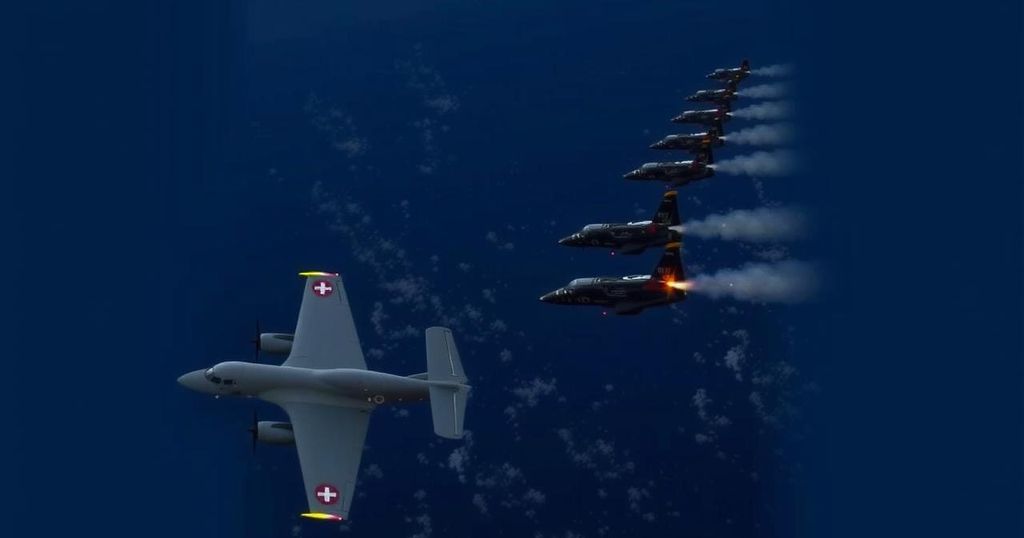Hurricane Hunters Conclude Active 2024 Season

The 2024 hurricane season concluded on November 30, during which the 53rd Weather Reconnaissance Squadron flew 107 missions into 12 named storms in the Atlantic, marking significant contributions to hurricane monitoring. Notable hurricanes included Beryl, a rare June Category 5, and Rafael, a late-season Category 3. The squadron prepares to transition into winter storm operations, emphasizing the continuous need for atmospheric reconnaissance regardless of the season.
The 2024 hurricane season officially concluded on November 30, marking the end of an active period for the 53rd Weather Reconnaissance Squadron, also known as the Air Force Reserve Hurricane Hunters, stationed at Keesler Air Force Base in Mississippi. Over the course of the season, the unit conducted 107 missions and logged 1,130 flight hours, surveying 12 out of the 18 named storms in the Atlantic and two out of the 13 tropical cyclones in the Pacific.
Lt. Col. Mark Withee, navigator for the 53rd WRS, described the season as an “interesting roller coaster ride” with exceptionally powerful storms occurring both early and late in the cycle. Notable storms included Hurricane Beryl, which became a Category 5 hurricane early in June and Hurricane Rafael, a Category 3 system that formed in late November. Withee emphasized the importance of continuous preparation during the hurricane season, highlighting the widespread impacts of these storms, such as Hurricane Helene’s effects felt as far inland as the Appalachians.
As noted by Lt. Col. Jeff Mitchell, the squadron’s director of operations, each hurricane season presents unique challenges, with operational demands varying based on where storms form, whether in the Gulf or the Atlantic. The squadron operates under the National Hurricane Operations Plan, ensuring 24-hour reconnaissance capabilities, with the capacity to deploy to multiple storms simultaneously.
This season, the Hurricane Hunters deployed five times, strategically relocating assets as needed, such as moving to Kelly Field in Texas to avoid Hurricane Francine. Collaborating closely with the National Oceanic and Atmospheric Administration (NOAA), the 53rd WRS and NOAA’s Aircraft Operations Center utilize their respective fleets, which includes WP-3D Orion aircraft and Gulfstream jets, to collect essential data for developing hurricane forecasts.
Over the entire hurricane season, the combined reconnaissance hours flown by both the 53rd and NOAA reached 1,609, with the 53rd contributing over 1,130 hours. Mitchell remarked on the distinctiveness of the season, particularly noting the striking occurrences of a Category 5 hurricane forming in early summer and another major hurricane in October, emphasizing the critical nature of their data in forecasting storm paths.
The 2024 season commenced with Tropical Storm Alberto in June, followed by the historic Category 5 Hurricane Beryl, and culminated with Rafael, which impacted Cuba. Although the official hurricane season has ended, the dedicated reservists of the Hurricane Hunters continue their vital mission, now prepar ing for winter operations, addressing atmospheric rivers and winter storm reconnaissance.
The article covers the conclusion of the 2024 hurricane season, detailing the operations of the 53rd Weather Reconnaissance Squadron based in Mississippi. This unit, known for its critical role in collecting data on hurricanes, has a long history of flying missions during hurricane seasons. The information they gather is indispensable for improving forecast accuracy and enhancing public safety during extreme weather events. Hurricane reconnaissance plays a pivotal role in understanding storm behavior and predicting their potential impact on various regions, particularly as climate change alters weather patterns.
In summary, the 2024 hurricane season presented significant challenges and unique circumstances for the Hurricane Hunters, with notable storms causing widespread impact. Their ongoing collaboration with NOAA and commitment to data collection underscores the importance of preparedness and adaptability in addressing hurricane activity. As the team transitions into winter operations, their expertise remains essential in maintaining public awareness and safety amidst changing weather patterns.
Original Source: www.aetc.af.mil







